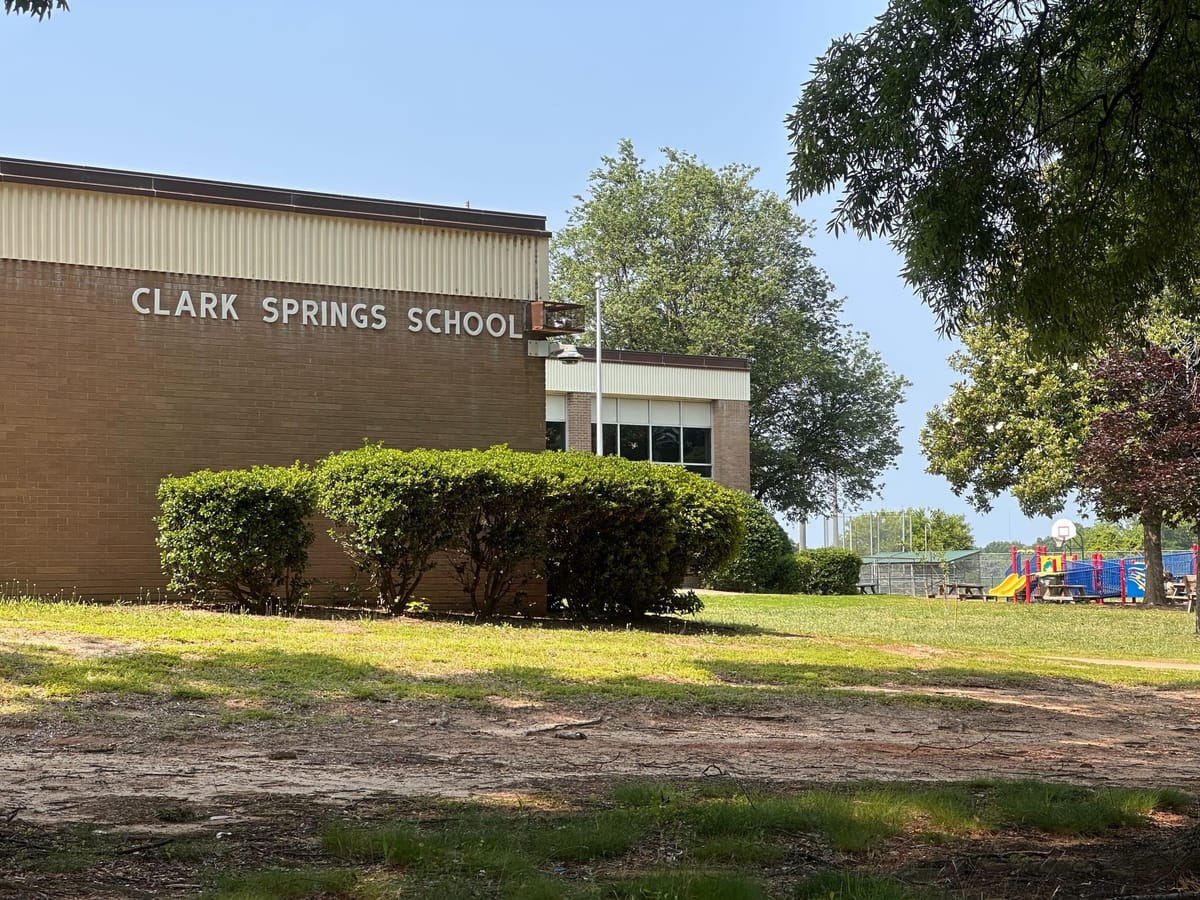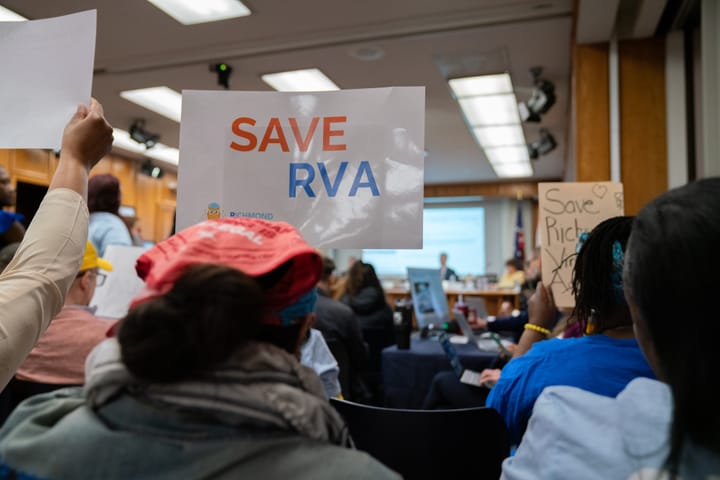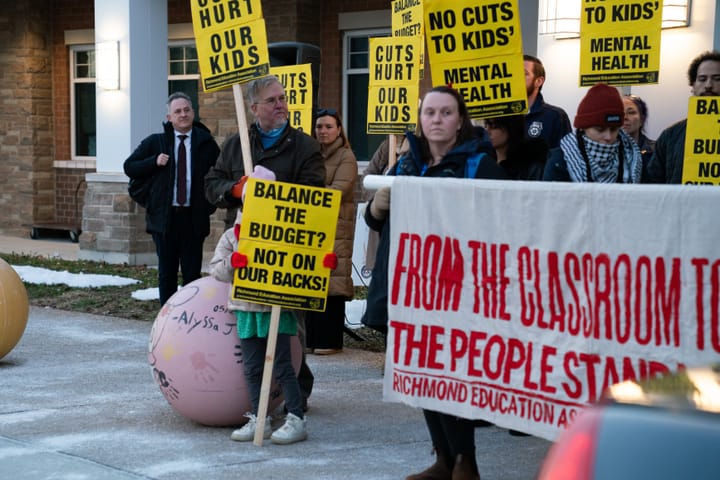RPS Roundup: New Clark Springs uses, Armstrong to keep its name, and the Richmond Ed Fund raised $7.5 million

Open High and RPS Wellness staff to use Clark Springs
The Richmond Public Schools administration has found a use for the currently vacant Clark Springs site, after the School Board rejected its proposal to mothball the empty building.
The administration is now recommending that Open High School and the division’s wellness office use the building with some limits, options initially presented back in June that the Board supported.
Open High staff and students can use parts of the building as spaces for physical education classes, standardized testing, school-wide monthly meetings, and events like award ceremonies, art shows, and homecoming dances. The wellness team can also run a clinic, pantry and support center for students and families across the district experiencing food, health and housing insecurities from the building.
Renesha Parks, the division’s chief wellness officer, told Board members that families have reached out seeking various needs, and using the building can help provide a broad range of assistance without being a hindrance on wellness staff. She gave an example of a parent who requested help with their laundry because they had a $550 water bill and a paycheck that they wouldn’t receive until a week later.
“This would be a particular space where that family would be able to come and do that,” she said. “They can do it in the privacy of the school. No one else has to know and we could be a resource for them.”
The division received a $265,000 grant from the State Department of Education that will go towards the wellness team’s projects in the building.
The division is deferring paying $4 million to replace the building’s HVAC system, which is nearly double RPS’ budget for maintenance this year and the reason why the administration originally suggested doing nothing with the building. The two groups would need to plan for any contingencies the outdated system may cause, Patrick Herrel, the division’s chief operating officer, said.
Board member Stephanie Rizzi (5th District) said that while she hopes that the wellness services can continue in the building, she wants Clark Springs to become a “comprehensive Open High School.” Administrators and Board members have previously noted that Open High’s building has very little space and no cafeteria. Students and staff were also using Clark Springs before Fox Elementary students temporarily moved into the building. Fox students have now returned to their own restored building.
Administration recommends keeping Armstrong High School current name, some board members oppose
Following arguments that supported or opposed renaming Armstrong High School, RPS conducted a district-wide survey in September asking specific groups where they stood on the matter.
Alumni of John F. Kennedy High School – the school that originally occupied Armstrong High’s building – presented a proposal to rename the school the Armstrong-Kennedy High School back in July. Board members have been torn on what to do about it since.
Nearly 380 individuals responded, with more than half of respondents being current students and staff.
The results led to administrators suggesting that the school retain its current name, as 70% of current students and staff that responded voted in favor of such (143 votes). However, 84% of John F. Kennedy alumni and community members were in favor of a name change (136 votes).
Board member Emmett Jafari (8th District) pointed out the distinction, and said that the basis of the administration’s decision is opposite of what the data shows, even though more students and staff responded to the survey.
Willie Bell, the division’s director for high school and athletics, responded, saying that he and other administrations would’ve wanted to receive more input from Armstrong alumni, but noted that the Board wanted to specifically hear from current students in previous meetings.
“We’re not discarding the former alumni of Armstrong or Armstrong-Kennedy, but … you all said you wanted to hear what our kids had to say, because they are [in the building] right now,” he said.
While he agreed on wanting to hear from students, Jafari said that those students may be out of the school in the next three to four years, whereas the community members responding are “established” and parents of current students. He suggested looking at the situation from a long-term perspective.
“I’m not dismissive of what the current students and faculty think but what I’ve seen and what I’ve heard – and what I’ve heard coming in here – really speaks [to] measures, giant measures to actually renaming the school,” he said. “I just want to make sure that we look at the whole proportion of it. Three to four years, in my estimation, should not outweigh … what the community and the alumni [from both schools] think.”
Cheryl Burke (7th District) said that the situation “hits home,” as a similar issue is currently happening at her former elementary school in her hometown, where some parts of the school will be demolished. She also reminded Board members and the public of the decision the school board made in 2004 to remove Kennedy’s name off the Armstrong building, which resulted in school memorabilia being thrown out.
“When we stop calling the name, the history is gone,” she said.
It was for that reason that she was one of the Board members who requested having student input. But she also echoed Jafari’s concern, asking administrators “why did we ask the community and the parents,” if the division was only going to pay attention to what students and staff said.
She expressed concern with the way the survey was distributed, as some community members told her that they were unaware of the survey. More responses would have been appreciated, she said. Solomon Jefferson, the district’s chief academic officer for secondary education, said that administrators reached out to as many alumni from both schools as possible in a short amount of time.
The recommendation also calls for placing a plaque outside of the high school entrance detailing the school’s history and installing a display case inside the school’s entrance to honor the legacy of Kennedy High School.
The Board will vote on the matter in November.
Richmond Ed Fund raises nearly $7.5 million in fiscal year 2025
The nonprofit’s original goal was $5 million.
“There were a lot of folks who told me I had lost my mind when I came up here and said that. Even one of our vendors said it’s impossible for organizations to grow that quickly,” said CEO Taikein Cooper.
Cooper said that the goal is to now raise $20 million, which is half of the amount the state is underfunding the division, according to a study conducted by the state’s independent watchdog, the Joint Legislative Audit and Review Commission.
Richmond Ed Fund also partnered with Chimborazo Elementary School to launch an independent fundraising campaign to build a new playground. The school has so far raised $118,000 out of $250,000.
The fund raised $62,000 and collected 1,000 books to support and improve early literacy, Cooper said, through the Fund’s Give 804 campaign that was launched in July. The campaign aimed to raise $50,000 and receive 10,000 books.
The School Board also voted to accept new board members to the Richmond Ed Fund, specifically Arshia Saiyed Freeman, an education and nonprofit consultant, and Ariel Nathan, a philanthropy manager.
Contact Reporter Victoria A. Ifatusin at vifatusin@richmonder.org






